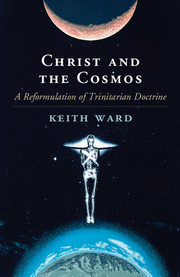Book contents
- Frontmatter
- Contents
- Preface
- Acknowledgements
- PART I THE THREEFOLD NATURE OF THE DIVINE BEING
- PART II THE BIBLICAL SOURCES OF TRINITARIAN THOUGHT
- PART III THE TRINITY, IMMANENT AND ECONOMIC
- PART IV THE SOCIAL TRINITY
- 22 Persons and Substances
- 23 The Idea of a Personal and Free Creation
- 24 The Logical Uniqueness of Persons
- 25 The Divine Nature and Freedom
- 26 Freedom in God and in Creatures
- 27 Persons as Necessarily Relational
- 28 An Ontology of the Personal?
- 29 Intra-Trinitarian Love
- 30 Infinite Gods
- 31 Divine Love and Necessity
- 32 Love and Alterity
- 33 Trinity versus Monotheism
- 34 The Passion of Christ
- 35 God and Abandonment
- PART V THE COSMIC TRINITY
- Bibliography
- Subject Index
- Name Index
26 - Freedom in God and in Creatures
from PART IV - THE SOCIAL TRINITY
Published online by Cambridge University Press: 05 September 2015
- Frontmatter
- Contents
- Preface
- Acknowledgements
- PART I THE THREEFOLD NATURE OF THE DIVINE BEING
- PART II THE BIBLICAL SOURCES OF TRINITARIAN THOUGHT
- PART III THE TRINITY, IMMANENT AND ECONOMIC
- PART IV THE SOCIAL TRINITY
- 22 Persons and Substances
- 23 The Idea of a Personal and Free Creation
- 24 The Logical Uniqueness of Persons
- 25 The Divine Nature and Freedom
- 26 Freedom in God and in Creatures
- 27 Persons as Necessarily Relational
- 28 An Ontology of the Personal?
- 29 Intra-Trinitarian Love
- 30 Infinite Gods
- 31 Divine Love and Necessity
- 32 Love and Alterity
- 33 Trinity versus Monotheism
- 34 The Passion of Christ
- 35 God and Abandonment
- PART V THE COSMIC TRINITY
- Bibliography
- Subject Index
- Name Index
Summary
The importance of freedom, in the case of human persons, is that they can choose one of a number of possible states (that is free creativity), and they can choose between self-regard and love of the good for its own sake (that is moral freedom). These are great goods, and much better than their opposites – having no choice about what happens next or being unable to avoid choosing evil.
But such freedom is not absolute. Humans have varying degrees and sorts of capacities: some are good at music, some at craft work, and some at gardening. Humans do not choose to have those capacities, though they can choose to improve or neglect them. Also, the states that humans can choose are limited by the knowledge of what is possible for them in their social and historical context. An ancient Egyptian could not choose to write a symphony – it would simply not be a possibility for ancient Egyptians. But that is not a fact that is freely chosen. Creative freedom lies in making the best of our possibilities and capacities – or in failing to do so. In other words, the greatest freedom lies precisely in finding and realising a role that is proper for us, that is built into our natures and situations and that will realise ‘what we are meant to do’. We do that creatively, by developing our capacities in original and perhaps, if we are really good, in unique ways. Creative freedom is the ability to develop in original ways the capacities which constitute our nature. Freedom cannot be absolute, because it consists in creatively developing what we by nature are.
Moral freedom, too, is distinctive of human persons. Moral freedom is the ability to choose between self-regard and altruism, or between love of self and love of good. It is not absolute, because there exists an obligation to seek what is good but an inclination to seek what pleases oneself. Obligations and inclinations constrain human actions, and humans are said to be morally free when they decide to follow one constraint rather than the other.
- Type
- Chapter
- Information
- Christ and the CosmosA Reformulation of Trinitarian Doctrine, pp. 166 - 170Publisher: Cambridge University PressPrint publication year: 2015



